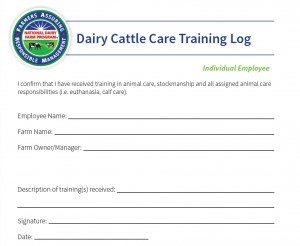Meeting the Continuing Education Requirements of FARM Program Version 4.0
Meeting the Continuing Education Requirements of FARM Program Version 4.0

Version 4.0 of the National Dairy FARM Program is now in effect from January 1, 2020, to December 31, 2022. One of the changes to this version is the requirement of training and continuing education for employees as well as family member employees and owners. Version 4.0 requires continuing education in animal care and handling for those with animal care responsibilities, and job-specific training for the following topics if they apply:
- Stockmanship
- Pre-weaned calf care
- Non-ambulatory animals
- Euthanasia
- Determining if animals are fit to transport
If this requirement is not met for non-family member employees, it will trigger a Mandatory Corrective Action Plan (must be corrected in less than 9 months); and if it is not met for family employees and owners, it will trigger a Continuous Improvement Plan (must be improved upon within 3 years). While this new standard includes more paperwork, chances are you and your employees are already meeting the continuing education requirements; you just need to document it. Continuing education can be achieved in many ways, and most don't require you or your employees to leave the farm. Below is a list of some examples of potential training and continuing education opportunities:
- Working with industry specialists on-farm (veterinarian, Quality Milk Production Services, Cornell Cooperative Extension, etc…)
- Dairy industry meetings
- Job shadowing with experienced employees and management
- Formal education (degree programs)
- Reading articles (CCE newsletters, Hoard's Dairyman, Progressive Dairy, etc…)
- Watching webinars and training videos
- National Dairy FARM Program training videos: https://www.youtube.com/channel/UC3N-BiUEYldTTFtFhTQdEQg
- Merck Dairy Care 365: https://www.merck-animal-health-usa.com/dairy-care-365
- Cornell PRO-DAIRY webinars: https://prodairy.cals.cornell.edu/webinars/
- Participating in the New York State Cattle Health Assurance Program (NYSCHAP)
The FARM Program provides a template to help you record training and continuing education for each person and it can be found at https://nationaldairyfarm.com/producer-resources/resource-library/. For help understanding the updates to FARM 4.0, for paperwork review, or a barn walk through, contact Regional Dairy Specialist Lindsay Ferlito (lc636@cornell.edu, 607-592-0290) or Alycia Drwencke (amd453@cornell.edu, 517-416-0386).
Upcoming Events
Crops, Cows & Critters - Southwest New York Dairy, Livestock & Field Crops Newsletter Sponsorship
December 19, 2025
Our two forms of publications feature research-based and timely information from our four specialists, listed to the right, along with local event notifications and Cornell University outreach. This information is provided to participants who range from dairy, livestock, and field crops producers to agricultural suppliers and consultants.
Weekly Email Update: Shared with 625+ households who have signed up with our program.
Monthly Paper Mailer: To reach our stakeholders and farmers who lack internet access, we send out a monthly mailer where your company's logo and contact information would be featured with a mailing list of 330+ households.
If you sponsor our weekly and monthly publications you reach approximately 955 households.
Visit our website to view our newsletters!
2025 Cornell Food Beverage & Animal Feed Manufacturer Survey
December 19, 2025
Industry and Educational Advocates for New York State's Food, Beverage, and Animal Feed Manufacturing industries:
As you know, NYS has a diverse food and beverage manufacturing industry, in both the types of industries that exist and the wide distribution of firms by scale. Many manufacturing firms have strong backward linkages to agricultural production sectors in the state that support both farm-level and downstream food industry firms and consumers. In collaboration with the New York State Department of Agriculture and Markets, a team from Cornell University's Charles H. Dyson School of Applied Economics and Management has recently rolled out the 2025 New York State Food, Beverage, and Animal Feed Manufacturer Survey. The industry will benefit from an updated assessment of the industry that informs private and public investments and opportunities to support firm growth and improved profitability.
Cornell Organic Field Crops & Dairy Conference
March 6, 2026
Waterloo, NY
Farmers, researchers, educators, and agricultural service providers from across the Northeast are invited to the 2026 Cornell Organic Field Crops & Dairy Conference, held Friday, March 6, 2026, from 8:00 a.m. to 4:30 p.m. at the Lux Hotel & Conference Center in Waterloo, N.Y.
Co-hosted by New York Soil Health and Cornell CALS, the annual conference brings together leaders in organic grain, dairy, and livestock systems to share practical tools, new research, and farmer-tested strategies to support resilient and profitable organic production.
Announcements
No announcements at this time.





